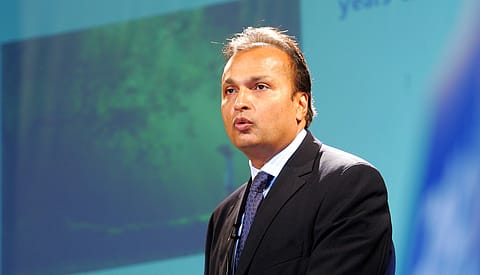Insolvency suspended in Reliance Infra: Anil Ambani’s group eyes comeback in green energy and defence
The appellate tribunal stalled the insolvency process as R-Infra paid Rs 92 crore interest soon after the resolution order

The order of the National Company Law Appellate Tribunal (NCLAT) to suspend the insolvency resolution in Reliance Infrastructure (R-Infra) has become a sigh of relief for Anil Ambani’s Reliance Group, which has been planning to ramp up its business in renewables and defence.
The group, which lost most of its crucial businesses like telecom, financial services, and naval and ship building to bankruptcy, has been fighting for survival, after IDBI Trusteeship Services (operational creditor)—a trusteeship company jointly promoted by IDBI Bank, LIC, and GIC of India—had filed a plea with the National Company Law Tribunal (NCLT), Mumbai, to start insolvency proceedings against R-Infra over a default of ₹88.68 crore (excluding interest).
In the case filed in 2022, the NCLT ordered the initiation of the Corporate Insolvency Resolution Process (CIRP) in R-Infra on May 30. In the NCLAT hearing, R-Infra lawyers argued that the creditor demanded only for the principal in its 2022 appeal and the company has duly paid it. However, the creditor adjusted the amount against the interest dues of Rs 92 crore, said sources close to the development.
“We have cleared the remaining dues soon after the NCLT order for R-Infra’s insolvency,” said an executive in the know. With this, the company is out of the insolvency resolution process, he added.
The insolvency issue came up when the group was planning to build its assets in renewable energy, besides defence. Reliance Power recently partnered with Bhutan's Druk Holding and Investments (DHI) to develop renewable energy projects in Bhutan, including a 500 MW solar power plant and the Chamkharchhu-1 hydro project. Before that, R-Power's subsidiary, Reliance NU Suntech, secured a 930 MW solar energy contract from the Solar Energy Corporation of India (SECI). It is India's largest solar and battery storage project.
R-Infra has been targeting to generate Rs 3,000 crore from the export of 155 mm ammunition and aggregates by FY27-end. The company is estimated to export Rs 1,500 crore of large-calibre ammunition in this financial year.
Bankruptcy is not new to the group. Anil Ambani’s key companies—Reliance Communications (R-Com), Reliance Naval and Engineering, and Reliance Capital (including subsidiaries Reliance Home Finance and Reliance Commercial Finance)—became bankrupt earlier and were tried under the Insolvency and Bankruptcy Code (IBC), 2016. IndusInd International Holdings Ltd of the Hinduja Group acquired Reliance Capital in the insolvency resolution process. In 2023, Swan Energy Ltd acquired Reliance Naval. R-Com's insolvency has not been completed yet.
Recommended Stories
In 2008, Anil Ambani was the sixth richest man globally with a wealth of Rs 2.12 lakh crore after he raised a record Rs 11,563 crore in the Reliance Power IPO. The group then had an aggregate market capitalisation of around Rs 4 lakh crore. The wealth of the younger Ambani crumbled to below Rs 1,000 crore in 2019.
However, the remaining companies are trying to recover by reducing debts and cashing in on the core power business. The group has one more listed company, Reliance Power, besides R-Infra. Its assets include nearly 1,000-megawatt power projects, Mumbai Metro, Delhi power distribution and a few roads.
The share price of R-Infra has spiked from its bottom in the past five years, growing 1,700% in the last five years. R-Power shares jumped 2,550% in the same period. The combined market cap stood at around Rs 40,000 crore. The promoter holding in R-Infra is just 16.5%, while the Ambani family’s stake in R-Power stood at nearly 25%.